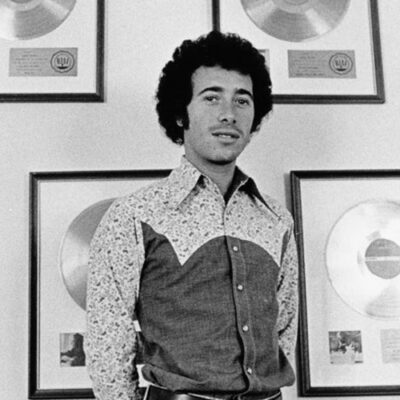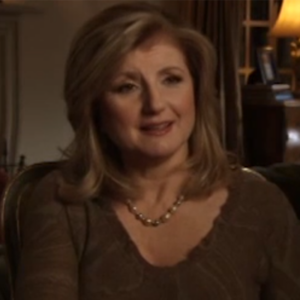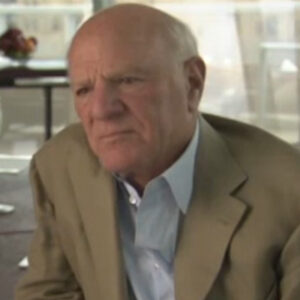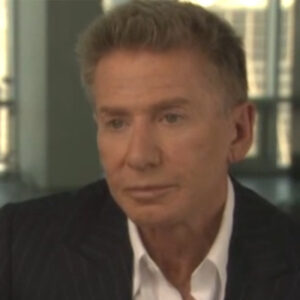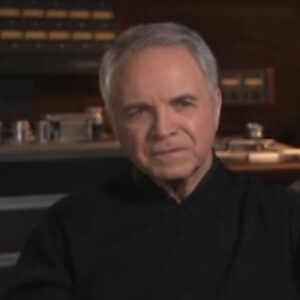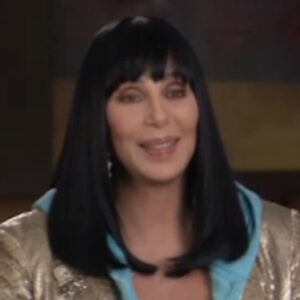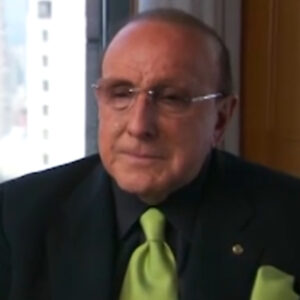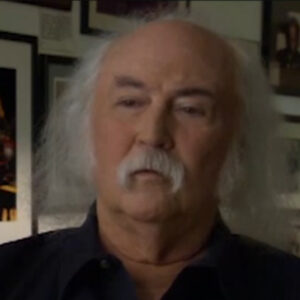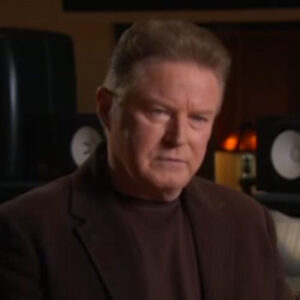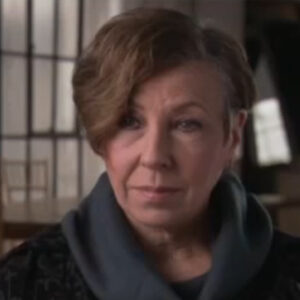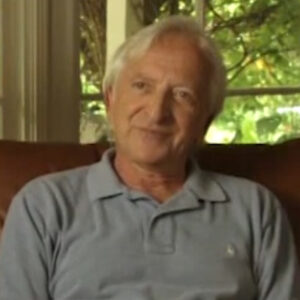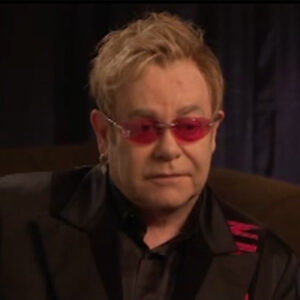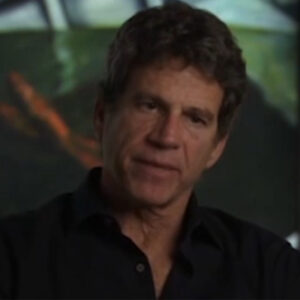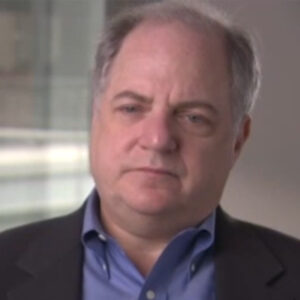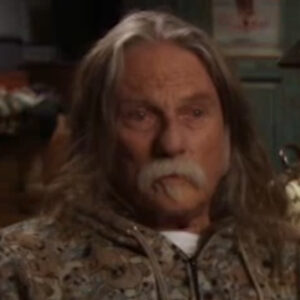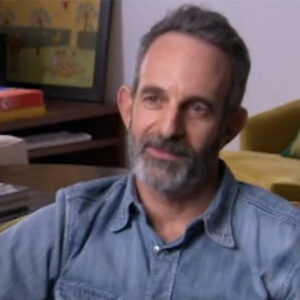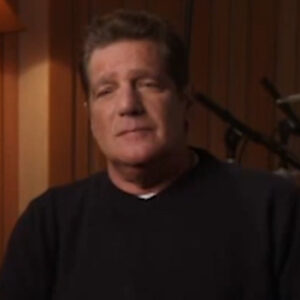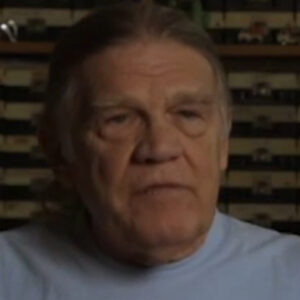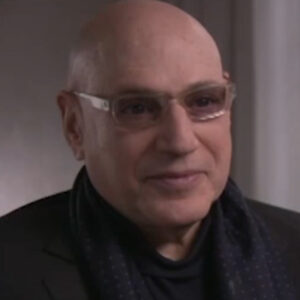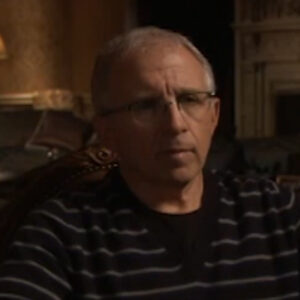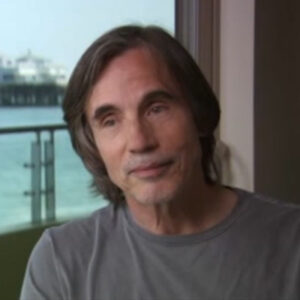Speaker I had of some friends of mine, some mutual friends of his and mine that had set up a meeting. I was I was in Los Angeles. I was living in New York. And I was out here for some things. And they said, David Geffen would like to meet with you, you know, so I didn’t know that much about David at the time because it was a very West Coast thing he was doing with his record company or his management. I know I didn’t even completely understand it, but I went over to his office at the end of the day one day, and I remember this pretty clearly and went in. And within five minutes he was telling me about what his psychotherapist had discussed with him that day. It was so candid. It’s so open and kind of disarmingly charming, too, in a way that it was refreshing. And I was thinking, wow, because I was from a different side of the tracks where I was from. You didn’t tell anybody anything unless you had said and David was so open and and I don’t know, there was something liberating about meeting him. I enjoyed this kind of devil may care, you know, about all of that. We don’t care about that stuff. So. I spent, I think 45 minutes talking with him, and but it’s fine that 45 minutes was up. I felt like I’d known him for years. It was just it was so refreshing.
Speaker And at the end of our meeting, we never talked about music. You know, we just talked about life in the world and stuff, and that was interesting, too, because. I was thinking about record executives and the heads of record companies that I’d met in the past, and like we do, we can we compare these things.
Speaker And and this was very, very different. And at the end of the meeting, he said, listen, why don’t you come over to my house later on? We have a bite to eat. Some people are gonna come by to be great. And I said, I’d love it if you would come over. And I thought, wow, this is kind of fast track here. And I’m trying to size up the whole thing. And and so I said, OK, yeah, OK. And I when I went over there, I found out that his housemate, that he was living with, Joni Mitchell in this house. And I said, oh, that’s interesting. He lives with Joni Mitchell, who is a Canadian. So I felt a little more comfortable in it.
Speaker And.
Speaker And pretty soon, Joni Mitchell says to me, I just wrote a new song and she takes out a guitar and she hands me a guitar.
Speaker And the next thing I know, we’re we’re playing music in this house. And I look around and Warren Beatty standing there and Jack Nicholson’s over here, and there’s all of these people that have just shown up out of nowhere, it seems. And I thought he’d put this together in the blink of an eye. And I thought, pretty good. Pretty good.
Speaker So anyway, it was the start of our that very day was the start of a friendship. What was the song? I don’t remember the name of the song, you know, but I remember. I remember the name of another song situation with her.
Speaker So then this was. I mean, I’m just having flashbacks there, as you know, I was thinking about this. So I was living in Woodstock, New York, at the time. And David was going to come up and visit. And he was going to meet the other guys in the band and just see what Woodstock was like up there and everything. And he came up and. And it started there just like a lovely visit and everything. And every once in a while, there’d be a few little business things thrown in here. Right. And, you know. And in the course of him being there that time, he stayed at my house. I had never met a record company. The guy ran a record company that would come to your house and stay there until you agreed with what they were proposing. He slept on my couch until I said yes. That sounds like a great idea. What was he proposing? He was proposing that he wanted to sign the band to his record company and had a million ideas, all kinds of great ideas.
Speaker And so I. You know, but I was just trying to understand it all and and and, you know, put one foot in front of the other. And he was taking leaps and bounds, but it was exciting and it was great. And his ideas were great. And and it was a revolutionary attitude towards the music business to what he what he was proposing at the time. You know, I was like, OK, why don’t we do this? Let’s split it 50/50. OK, we’ll just be partners in this. All pay for the record company stuff in them, in recording and everything and, you know, and budget and we’ll just be partners. And I was like, whoa. Because the record company was like, you’d make record company deals. They’d say, OK, you get three percent, you know. And never mentioned where the other 97 percent went. And so it was revolutionary at the time that you did that somebody would talk about a partnership like that. So so it excited me. Just the freshness of all of this. This was Elektra Asylum. Yes, this was asylum.
Speaker This was asylum, not Elektra.
Speaker Yes, it was. His record company was asylum. And what was this? You know, this was 73.
Speaker He had actually sold asylum. Oh. Oh, he had. Yeah. And though I don’t know, but it’s so complicated.
Speaker But it was at that point that he went to work at Warner. He sold it to Warner. And Elektra aside, they combined Elektra Asylum and then asked him to run that no.
Speaker Maybe that’s what it was. Yeah. I don’t even remember. I just remember the name. Asylum. You know, we were like, go meet for crazy people like us, you know?
Speaker So I think he meant it more as a haven. I think so. I a sanctuary. Yeah. So. So anyway, he came up and we had a great time and he saw, you know, what Woodstock was about and met the other guys in the band and everything, and we stepped on to the next level. But his next wooing was, he said. Why don’t he said, Joni and I want to invite you and Dominique, my wife, to come to Paris with us. Dominique says French, she speaks French, should be Greb, be perfect. So we said, that’s it sounds good. So we all went to Paris. David set up the whole thing. We were staying at the Ritz Hotel and it was a wonder if we just. We did what you do when you go there. We went shopping and David want to go to all the great restaurants and everything. And we had a wonderful time. And then after we were there a few days, he came and he said, listen, the Cannes Film Festival is going on. Why don’t we go down there for a few days now? I was like, this is all working. This is good. So he said, I’m gonna go downstairs and take care of the bill of the back in a few minutes. And he does come back in a few minutes and he looks like he’s in shock. I’m like, what happened? He said, they don’t take credit cards. And I said, well, did you tell him that you would write a check? I said, yeah. They said they don’t know me. So he was like, I don’t know how we’re gonna get out of here. And so I was I was trying to not take this whole thing too seriously, so I said, well, listen, I’ll lower the bags down out the window. You go down and get the car, OK? And he said, Are you crazy? We’re gonna go to jail. They’re going to put us in prison here. I got to figure out how to pay this bill. And in the meantime, because we were leaving on our way to go to our next destination. And so he’s pacing and thinking of things. And finally he thinks of somebody to call to tell them that he would be good for them for the bell. He said, I I don’t have that kind of money in my pocket. And somebody did vote for him. And in the meantime, while we were there, Joni Mitchell wrote Free Man in Paris. Now, this gives a whole other meaning to free man in Paris. This means I didn’t have to go to prison for not paying the hotel bill.
Speaker Now, what is it like? What was Joni? I want to talk about that song that. What is it that she was seeing in him in this time where the song come from?
Speaker I don’t know, you’d have to ask Joanie, really. You know, the question of what she was thinking about that. But what it seemed like was that why we were over there? He. He didn’t have a worry in the world. He wasn’t on the phone calling and worrying about stuff because he was back then. You know, he was a very worried person about everything. He was so hands on with everything. And I think that she just being a really close friend of his being housemates, Saad, his liberation and know and seeing him in this kind of way just inspired her. And and I think that that’s what she was writing about. But she knows better than I do.
Speaker What. What was their relationship like? What you’ve been together with them.
Speaker They were like really good pals. You know, I you know, and I didn’t know the inside of it and I didn’t know what happened later in their friendship. I don’t I don’t know any of that stuff, really. All I can really talk about is when I saw them, they were really, really good buddies. And he loved the music that she made. I mean, truly, truly loved it. And and and I think that she felt protected by him.
Speaker So but, you know, that’s from my, you know, distant observation, what was going on in your career at that time? The band was still together. Yeah. Oh, yeah.
Speaker At that time mean obviously it was that’s I want to sign you, but.
Speaker Well, one of the things with David when he came to Woodstock.
Speaker Before he left Woodstock, he convinced me and I had this beautiful old stone house, 150 years old, in Woodstock. He convinced me to leave that place and move out to Malibu into a house sight unseen. That’s Sam Peckinpah. And I did it. I mean, he just had a way of conjuring up tremendous trust and belief in. And you know what? You know what he thought was a good idea. He says, you know, he was just so convincing.
Speaker What did he say was going to be for there for you in Malibu, California?
Speaker He just you know, he was just thinking, shuffle the deck. Try something new. You’ve never experienced anything like this. You live right on the ocean there. The waves come right up to your house. Be great for your kids, your family. This, you know, it’ll be in new inspiration for you. And you’ll write some great songs to record on my record company. And I’ve I thought it all sounded really good.
Speaker I want to ask you one question. One hit when Joanie played free, man. There you go. All right. In your eyes. When Johnny play free man in Paris for David, how do you respond?
Speaker I don’t know. I. I don’t know that she played the song for him. Because I wasn’t there, if she did do that. I know she came back and recorded it and played it for him. And I, I don’t know. I saw a certain amount of pride in his eyes. Yeah.
Speaker I’d be proud to get that one. She was very, very proud that Joni. Write a song about him. So. So you moved to Malibu. And Dylan was also living there.
Speaker Yes, but Bob. And this was a and this was a complete coincidence. All of these things were completely separate at the time. But but Bob Dylan had it for just a change of pace. He had moved out to Malibu temporarily at at the time. Just, you know, for something, you know. You know, you want to do things every once in a while to just freshen up everything and and give you new ideas, new inspiration. And I was kind of like that.
Speaker So when when I moved out there, just because Bob was the only one other person in Malibu besides David, I even know, you know, we hooked up and. And we were really enjoying it being out there to the point that I called all the other guys in the band and said, come on out here. This is pretty great. And they all came out to Malibu and we got a studio out, Malibu that we put together ourselves. And it just felt like this works.
Speaker Now, when? David was wooing you and met the other guys. Everything did it. Did it go smoothly from the beginning? Did they like him? Did they feel the same way about him? You did.
Speaker I don’t think the other guys in the band felt the same way about David is as I did only because I don’t think they knew him as well as I did. And and he just really went out of his way to let me know what a great guy he was, you know, and I appreciated that. So I would convey it to the other guys. I’d say, oh, my God, David came up with a great idea that maybe we should consider this symbol other things. And so everybody thought that was kind of my chore to deal with David. They were like, we don’t really hang out with record company executives anyway. So, you know. And it was it was pretty much like whatever works.
Speaker The 50/50 deal must’ve been pretty attractive at that time.
Speaker It was unheard of.
Speaker What was he doing that with everyone? I don’t know. I don’t know what he was.
Speaker You know, had you I mean, you had you heard about David before you met him from the early asylum years? Well, when he really he left being an agent, moved to California. He and Elliott started this management company and vaguely.
Speaker I didn’t. I went into this in. Yeah. With very little knowledge of of his backstory. And when he told me his back story, I thought it was a great story and it made me even more impressed with him as a person.
Speaker What did he say that is? What did he. How did he decide his story?
Speaker His story was. You know, it’s starting out at the bottom, starting up with knowing nothing. And looking around and learning as quickly as he could. And and and I think that we related on this level, too, you know, because I started very young and in which, you know, and was like a sponge, too. So we were both talking about that part of our lives, of just that process, of what you learn, what you’re drawn to. And.
Speaker And I loved his story about starting out going to these offices and delivering mail and looking at this people and saying, I can do that. Can I do that? I can do that. Better to be here. I got a kick out of that.
Speaker So. You and describe the opening night of the Roxy. I think you were there with David and Dylan and. Share, I join you health about that.
Speaker Well, you know that well, that reminds me of something when I first moved out to Malibu at David’s request. And and and helping with him and Cher had just gotten together. And I knew enough about David to know that this was an unusual. It was an unusual relationship for him. And and I’ve got to tell you, he was crazy about her. I was there. I saw it. And he was head over heels for a share. And she was terrific at the time, too. Very funny. Very savvy. And it was a lot of fun just seeing them together. And I saw them together all the time. And then one night we were going out for dinner and then we were going to the Roxy and. And and it was and it was David and Cher and Bob Dylan and his wife and my wife Ann and me and. And Neil Young was playing. So it was like, this is this is just terrific. You know, I’m here with your friends and everything. And this Neil Young’s road manager, somebody said came over to the table and said, would you like to go backstage and say hello to Neil? And Bob said, no, we can’t. We just eight.
Speaker So what to think of that? But anyway, he said, oh, okay.
Speaker And left and David just fell apart laughing. I mean, in hysterics and. And Cher was wearing. I’m just a dissolve. Is it just flashbacks coming back. But she was wearing this beautiful cowboy hat with feathers in it and stuff. And and Bob was saying to her, wish you could that had I got to get a hat like that.
Speaker And she said, well, I’ll get you one and 10. And she was like, did you want to try and use. No, no, no. I don’t need to try. But I need to get one of those hats, you know? And at the same time, she didn’t know whether he was being serious or not since he had just said, no, we can’t come backstage. We just eight, you know. So it just put the whole night, you know, and, you know, made it everything a little bit bent. But Neil Young’s thing was fantastic. It was a great opening for The Rock, Roxy. And we were there.
Speaker I think the don’t start wearing this in his head. You ever see Renaldo and Clara? That’s right. That’s better to. It had started with Cher.
Speaker That’s right.
Speaker But see, Bob Dylan’s always been stealing things from Cher for years.
Speaker Did you see our film, Bob Dylan, by the way? That’s Marty directed. Of course. That was American Masters. Yeah, I know. I know. We’re really proud of that one.
Speaker Oh. Martin, just. You’re all over it. Yeah. Marty did a brilliant job. Yeah. I was like in that film, I think I was 20 or 21 or something like that.
Speaker Well, what’s it been like to be on that level? Incredible. So how did then.
Speaker How did. David, go about wooing Bob.
Speaker Any one of them will win. When I became when I moved out to California and was hanging out with David, he said, why have you never considered the band and Bob Dylan doing a tour together again?
Speaker I mean, that tour that you did before was like history. Why not do another one? The London tour? Yes. The first time that you could just say, well, weep Bob Dylan and the band before we were the band of when we were playing with Bob, we had played all over North America and Europe and Australia and and we had been booed all over the world so that there was something left to prove, I guess. But David said, you know, now in 1973 says, why have you guys never, ever done another tour? And I said, well, we just haven’t thought of her. Got it. Got around to it is is Alder’s. No one’s had anything against the idea. And he said, well, why don’t you let me help try to put this together. This would be extraordinary, you know. And from the last thing you did, that was like a musical revolution. Wow. We could do something really amazing now. So he hadn’t met Bob and I. I introduced them and and they got along really well. And David had all of these ideas and and it was exciting. And he presented it in a very exciting way. So, you know, we talked about it and said maybe we should do this. And, you know, it might be, you know, a lot of fun to do this at this time, at this time. And and now enough time had passed where it didn’t seem like the obvious thing to do. That’s a we didn’t like before because people connected us, the band and Bob Dylan for so many years that had died down now. And the band had done some very successful things. And and now it seemed like all this this might feel like new again. So, yes. So we decided to do it. And and David was really instrumental in helping us put the whole thing together and doing it in an in a comfortable way to like it wasn’t going to end up being a nightmare of some kind which tours, you know, can be an especially back then to it. Was it. It was a different state of the art back then. And, you know, buses and I don’t nobody want to get. I didn’t want to get back on a bus, on the bus with we’d already paid those who I felt like so David to help figure figured out and got Bill Graham involved in it. And I’d known Bill Graham and but it was a bit and it was new for Bob. He didn’t I don’t think Bob had had any band working things with with Bill Graham and didn’t know David that much. But the idea seemed like it was gonna be good. And and.
Speaker And then David said, well, if you’re gonna do this tour, why don’t you make a record? And then when you know and and then then the tour can serve the purpose of that, too. So we without having very much time. We went in with Bob and and made a record and had great fun doing it. But it maybe wasn’t is for prepared is is what we would have done if we’d had more time. Which record pieces. This was called Planet Wavves. So so we did the record and we went out and did the tour.
Speaker It was tremendously successful and and I had a lot of fun doing it. I was in Washington. I saw you. Really? Wow.
Speaker Oh, that was you with a lighter. You were actually matches. Oh, yeah.
Speaker But anyway, it was one of the highlights of my life. That was it was an incredible coup for David to get.
Speaker Yes, it was. Yeah, well, the idea in the music industry and the whole business of the time, too, for David to be able to score Bob Dylan and the band and it all be on his record company and everything, it was it was big stuff for him and. And I just thought, you know, and he he deserves it because he just works harder than these other people. And is just, you know, bringing all of this inspiration to the table to say we could do this and we could do that. And it wasn’t like he was reinventing the wheel or anything like that. But he put all the pieces together and put it up there and. And we went in that direction because he made it sound very exciting.
Speaker Now, at the very end of the tour, there was a closing night, whatever would happen on that night. When he said they’ll be all right.
Speaker So do I think the last show that we played was in Los Angeles at the Los Angeles Forum. And a lot of music industry people were there. And at the end of the show, nobody did much talking during these concerts. It wasn’t like, hey, let me tell you a little story now at all. It was like play the music and try to play it really good. And that’s what we felt, felt we were there. But the last night, Bob Dylan took it upon himself just to thank the crew and the people that were working for a long time on this show. And Bill Graham and everybody. So he thanked everybody. But he didn’t thank David Bowie because he was really thinking about crew more than he was thinking about record company or people behind this. And it it just didn’t strike him that way. I don’t think for a second that Bob was dismissing what David had brought to the table in this at all. So but anyway, he forgot. And because of all the music industry people that were there, David felt slighted by this. And.
Speaker And so after that, I, I, I talked to Bob about it and I said, jeez, you know, it will really hurt his feelings that, you know, that he was left out of the thank you’s and that we should maybe. Why don’t we go see him and just explain? You know, and you can tell them that, you know, you didn’t mean that you were really thinking about these guys lifting stuff and that kind of thing.
Speaker You know, I explained to him and mom was like, do we have to add a little bit your arm? And then, you know. So anyway, we went and we said it to him and.
Speaker And. And. And David was, you know, accepting of it. But you could you could just tell it that it really hurt his feelings. And so then we we just thought, I’m sorry.
Speaker We got it. Steve.
Speaker I’ve I don’t know. I think that Colonel Tom Parker had some kind of a relationship with Elvis. There was more than the usual percentage. And I don’t know that I’ve ever heard of a manager. Taking 50 percent of the publishing. Percentages of the publishing, but it kind of depends on what you’re bringing to the table, to what you did in regard to this. But usually when someone else writes the songs and in during this period in the 60s and 70s, all those old stories were going away about people being cheated out of their songs and cheated out of their publishing and everything. So there were new rules being made for sure. And most of those rules and David, are being a big part of that. Just, you know, just saying I think that the artists should be much more involved in the partnership than what they have been in the past. And that was very different by other record companies. Didn’t like what David was doing.
Speaker They’re thinking you’re making us look bad and you’re offering deals that we’ve got to compete with and we don’t want to we don’t want to change.
Speaker That’s interesting because he did keep working for a lots of record companies. He was bringing in the talent. Anyway, let’s talk a little bit about the second the second before we do. We didn’t really finish the story. He was right in the middle of talking about that final night of the. Right. The show. And basically you left off and said, did you actually cry with see? But Robbie doesn’t remember that that happened then. Then you went on to say, didn’t you take out.
Speaker Oh, yes, yes, yes, yes. Let’s go back to where we were before we stopped all this. So you and Bob went over to David’s office, apologized, and then could you say then we took outsmarts?
Speaker Yeah. After we went over to David’s office and Bob and Bob explained to David that, you know, that it was just a harmless mistake, that he wasn’t trying to disseminate any kind of way and any, was it? But nevertheless, in front of all the people that were there, David felt, you know, that that he’d been left out. And so then the I the idea came up from somebody. Listen, let’s take out because it was the end in front of the industry. So let’s take out an ad in one of the industry mags and, you know, just thanking David for, you know, what a great thing he did in this and what a great job he did. And then it came up to just throw it was David’s birthday coming up. And so Bob and Susan share and everybody threw him a big birthday party. And. And it was kind of an extreme birthday party. I mean, those people like juggling and midgets running around and like it was like a circus, you know? And a lot of people played music and it was a great party.
Speaker And.
Speaker Probably because of Cher, you know, in this party and everything. I felt like I felt like David was getting over this, you know. You know, his feelings about being left out of this thing. So I was glad to see all of that happen and that we were moving on.
Speaker I read somewhere you actually tried to warn David about saying, you know, not to like these were different kind of people. I mean, this is what I read. You said Bob’s his own kettle of fish. These other guys, they’re not.
Speaker That’s very true. Can you talk to me? Yeah. When I first moved out to Malibu and I remember specifically one night, David came out to pick me up and we were gonna go and have dinner, do something and. And we were talking about the possibility of this tour. Idea of doing this thing with Bob Dylan and the band and all of that and that. And I told David, I said, you know, I have to warn you, these people that you’re talking about, the other guys in the band and Bob Dylan. It’s not like a lot of the artists that I mean, the impression I had anyway. It’s not like a lot of the artists that you’ve been working with. These guys are right from the streets and they know the code of the road. It’s a different play here and they’re not looking for policy. Well, genius and all all of this. It’s not like that. You’re not going to charm them into who? Many things that have worked for you in the past. I know these guys. Trust me. And he said, don’t worry, I’m a big boy. Don’t worry about me. I can handle myself in this. And I think that we can do some great stuff.
Speaker So I thought, like, OK. I said it’s. Yeah.
Speaker So were you surprised then by his extreme reaction to his hurt that last night?
Speaker No, I wasn’t surprised because David was so candid about his feelings and so candid about everything that’s I wasn’t surprised by and anything that if he was hurt or disturbed about something, it was right out in the open.
Speaker And I didn’t I didn’t even realize that. I didn’t think. Oh, Bob forgot to thank David. It didn’t even cross my mind. And I was standing right there because I. I could feel what Bob was was pointing at. You know, what he was referring to in his thanks. So so I didn’t realize that until later. And then it was like, oh my God. That’s right. Oh jeez. That’s too bad, you know.
Speaker So why did Dylan and the rest of the guys in the band just question whether they wanted David to release their next record, which is before you before the flood? Why was that a question?
Speaker Well, after we did the tour and we recorded. We recorded concerts and in the tour and decided to make a live album of it because we didn’t know when we might ever do this again. And. And when all of that was stewing and we were working on all of that, it was somewhat taken for granted that this record was going to be with David because he had helped put this whole whole thing together and all of that. It made a lot of sense.
Speaker But I don’t think that it was any legalities in it is. It is because I’m just trying to remember the details of this. And as time went on and after some things happened in that. Really, what happened was Bob got cold feet and the idea and he I guess he was feeling had I’ve been with Columbia Records, you know, all my career and all of a sudden I’m doing this. I don’t know if it’s the right thing. He was having second thoughts about it. And when he was saying that the other guys in the band were feeling something similar to and. And I don’t know. And David and I were buddies at this time, and it might have even had something to do with. Yeah. You guys are buddies and evidence doesn’t have anything to do with us and everything. I don’t know. I just don’t know about this thing.
Speaker So that started stirring around. And as it you know, time was going on and I was just working on the record and everything. I wasn’t thinking about that stuff too much. And then it it was really rising to the surface. And I’d said, I don’t know. Ahead is my understanding. We’ve given our word that we’re going to do this.
Speaker Don’t we need to you know, don’t we need to follow through and. And the guys were like, hey, people change their mind about things all the time. And. You know, and Bob was just saying, I just I’m just not feeling it now. And the other guys in the band and I was like, holy moly. I mean, I. I didn’t know what to do. And so I kept. You know, I just kept saying I don’t I don’t know if this is right, guys, you know, just because all of a sudden now, you know, we’re going to turn this thing around. I don’t know. It doesn’t feel right to me until it got to the point where the other guys in the band and Bob were like, well, whose side are you on here? I was I got a little bit stuck in the middle of this thing. And I was like, it’s not a matter of being on anybody’s side. It’s just if I tell somebody and somebody who’s been so responsible for this whole thing that happened that this is what’s gonna happen. I just I don’t know. I think I’ve given my word. That’s all I’m saying. I’m not sticking up for him. But they thought I was sticking up for him. And then I don’t know if this stuff becomes we had this meeting and I don’t even like talking about this stuff.
Speaker But anyway, we had this meeting and with the guys in the band and Bob and their lawyer and David and we all went out to this place in this house, one of the guy’s house in Malibu. We go into and so the lawyer says, we’re gonna go into this other room. We’re gonna figure out what we’re gonna do. We’ll come back out and tell you.
Speaker So David sitting out there like, you know, and and I I felt kind of bad about it, you know, and and I thought, what difference does it make what company this is on? I mean, like, why we’re making a show of it. So anyway, we go in the other room and as they’re talking about it and the lawyers talking about and they’re saying you don’t think you can do whatever you want here, you’re legally free to do this thing. So. So they are. You know, it’s kind of growing in the room. The idea of not doing this with Dave and I’m saying, what? Don’t you feel like you need to do something? I mean, he he did, you know, encourage us to do this. Don’t we have to do something? And they’re like, not really. And finally, I was getting angry at this point and I said, well. Don’t give them anything then. And when I said that, I stood up and kind of yelled it out in the room. David’s in the other room and he hears me stand up, say don’t give him anything. And so anyway, we come out of there, the lawyer explains to him he’s crushed. Right. And leaves and goes and calls me the next day and says, I don’t. I don’t understand how you could do that to me. I’m saying, what are you talking about? I’m not I’m the one who’s fighting for you in this situation because that’s really what I believe. And it doesn’t have anything to do necessarily with just our friendship. It has to do with just general. You know, I just I thought we had said yes and, you know, and that’s what we should do. And he said, no, you did it. I said, I did it.
Speaker And I think that he was just really, really bent out of shape at the time and he was lashing out a little bit, but because he heard me say this in the other room, he thought it was it was me leading the charge here. And at that, he was just angry at everything and everybody and all of it. And I was the main person. I was the one closer to him. So I was the one standing the closest to him. And he kind of lashed out at me. And he thought that I you know, I did something which there was so little in it for me. You know, there was no incentive there to let something like this get in our friendship.
Speaker But for a lot of people that have been old friends with David, a lot of his old friends know that there could easily be a couple of years in their give or take where you don’t speak. Right. We didn’t invent this story. And but the bottom line is that David cherishes his friends and his friends think the world of him. So it ends up, you know, in most cases that I know of anyway, working out to be, you know, a happy ending.
Speaker You he did eventually get the record that he did.
Speaker But I think that he got it out of, you know, spite and money.
Speaker But he was safe from the humiliation. Yeah, within the record business. And that was important element to him, of course.
Speaker I mean, anybody has their pride and in front of everybody, you know, you think I look like a fool. I’ve told everybody that I have this. Nobody else could do this but me. And now the rug is gonna be pulled out from under me. That’s just a horrible thought. And me knowing him, I just knew how it affected him. And. And it took a long time before those wounds healed and that we became friends again because he held it against me.
Speaker How did you become. How did the rapprochement happen?
Speaker We after there was a couple of things. Couple of things that that happened. I saw David. In that period when David moved to New York and thinking he was very ill and. While he was in New York, the movie The Last was came out and there was a premiere for it and he came to the premiere. I think with Paul Simon. And after the premiere, he came back to we were having some friends over to my hotel suite at. And, you know, after thing. And he came by and said how great he thought it was. And he said, I think he just did a terrific job. And Marty did a great job and all of that. And and and I don’t know if that really meant a lot to me that that he thought, you know, it was really good and and put his feelings aside and and came over. And then the next thing and our friendship catching up and our friendship again was. I was gonna make a solo album and I signed with Geffen Records, and it scares me. And David was of the, you know, the frame of mind. He says, oh, I don’t get past anymore, you know. Let’s do something great together. And he was so supportive in it. And. And, you know, I couldn’t have asked for a more interesting record company situation. This guy who worked for him, Gary Gurche, was the one who was kind of spearheading this thing. And I think that Gary helped David feel okay about it, too. And I felt so much water under the bridge. I didn’t care anymore. And then we started hanging out over the years and friends and and eventually became like we were just as good friends is as what we were in the beginning.
Speaker That’s great. How is Geffen Records different, to your knowledge, from Elektra Asylum?
Speaker Geffen Records was a much well at this time. David had evolved to another place, too. He wasn’t he wasn’t sleeping on your couch anymore. You know, he was he was running the company and trying to make it really work as a great machine. And he hired terrific people to help him. Run the machine. And he put together brilliant people, he’s very good at surrounding himself with talented, smart people. And it felt like more like a real real record company than Elektra Asylum had because he had more experience and more knowledge and in a different kind of passion towards it. And he knew when to get out of the way as well.
Speaker Who were some of those people? Just kidding. Never knew the me at the record company.
Speaker Well, Eddie Rosenblatt was the president of the company and in and ran it on a day to day basis in Eddie Rosenblad. I think David had met at Warner Brothers Records and everybody loved Eddie. And so I don’t know how David did it, but he scooped him away from Warner Brothers without them being too angry at him and end. And Gary Gurche is well, who is real. Somebody was really good musical instincts. And and Gary did terrific things for Forgettin Records, too.
Speaker What about David’s musical instincts? Do you think he was driven by the music? That’s how he got started. It was about the music. It was about making money.
Speaker I think that it was a healthy balance with David between the business and how much he loved the music, too. I mean, he truly, truly loved the music. It gave him thrills and chills. You know, right down his spine. And but the idea to when he was looking at, you know, from his early days of discovering which path I’m going to take here, I want to go towards movies or script writers or directors or music or all of those different avenues, you know. And and when he looked at the music thing, I think he just felt a stronger connection to it and probably also that that he really believed that was doable for him. So I can do this, you know, I can do this and I can do it quicker than I can do the other things. And I like being around these people more than I like being around those feet. You know, he’s quick to size up situations that that he’s drawn to.
Speaker Did most of the artists. I know that some of the guys in your band didn’t quite feel this way. But do you think that. Until they were various fallings out. But do you think that Crosby, Stills, Nash, you, Joni Dylan, saw that in him, or was he just always a soup to them? Did people get that part of it?
Speaker I you know. And now here’s a very interesting aspect of David Geffen. I don’t think anybody ever saw David as a suit. Somehow or another, he escaped that whole stereotype. And he learned I mean, Ahmet Ertegun, who was a suit and Morris suit. But David, whether consciously or not, never wore a suit unless he just had to, unless it was an occasion that he dreaded. And he had to put on his suit for he escaped that whole thing. And in in his innovative spirit in the music business, allowed him to never have to present himself in a way that I’m going to wear a suit to this. It just it just wasn’t in his menu.
Speaker But did artists see him as a creative soul?
Speaker I guess, you know, Warren Beatty introduced him at an event that actually the event where he sort of publicly came out in the early 90s and said he’s a captain of industry with the soul of an artist. And there’s some debate. I mean, not not everyone agrees with that. How do you think most of the or how do you feel about it? How do you think most of the artists felt about that in terms of.
Speaker You know, I think that people recognized what David’s gift was and with the different artists. They knew that while I’m in here trying to write the lyrics to this song, he’s out there thinking about where to take this and what to do with it and how to break some rules and how to do this in a new way. And it’s not a bad thing to have somebody other looking at it in that kind of way. So that was exciting. And I and it wasn’t I don’t think that anybody said, David, I’m struggling with the chorus on this. Could you come in here and give me a couple of lines? I don’t think anybody ever thought of it like that. And he never presented himself in that kind of way. But he was keen to say, you know, this is the melody, a little bit drab in this section. Right. Doesn’t seem like it should go up or something. He would say things like that, just instinctual, you know, keep trying to hear it through people’s ears and. I think he did that is as good as most people as far as getting in the studio and saying, I don’t know. I think that the bass part on this needs to be looked at. Nothing like that. He would never. That’s what I was saying earlier. He knew when to get out of the way and he knew when to get in the way. Really well. And say, God, you know what we could do with this, you know, or we could go over there and how to present these things in, you know.
Speaker Just good ideas that’s been put beautifully.
Speaker So were you surprised? When David started DreamWorks, because that was that was another connection between the two. Yeah.
Speaker Yeah. Well, yeah, I was we were having dinners and hanging out and he was telling me about, you know, starting this new company, the first company and I don’t know, half a millennium or something like that of his first new movie studio and, you know, animation studio and record company. And of this painted this picture. And I thought, well, if anybody can do it. These are the guys that can do it. If you’ve got Jeffrey, Steven and David, my God, you know, it’s like they can do anything. So I thought I was like, this is very exciting. But my question was, ah. Just because you’re all a bit spoiled at this point, are you guys gonna get in the trenches to get this done? Because this is a lot of work you’re talking about. And he was like, no problem, everybody, we love this. And, you know, but I just I had slight suspicions in that area.
Speaker And then one night when I was having dinner with David, he said, you know, in this DreamWorks company, we want to do something really interesting with the music company in this. Come do this with us. It’s like, no, I just like to do what I do. He said, do what you do. Do anything you want to do, but come and do it with us. Said, I’ll give you my office. I’ll give you this. He said, whatever deal you want, it’s done what it’s come and do it. And he made it sound so like so much fun and everything. And it was with Mo and Lenny and Michael, people that I just thought were just terrific. Just the loveliest people in the whole music business that I’d ever met. And. And I’d had, you know, a relationship with them. So come on, come and do this well. Have a great time, you know, and we’ll think of some good things to do and what we’ve done. And, you know, the music company, you’ll feed the animation company with ideas, the animation, the soundtracks and all of this will, you know. And it just sounded like a fascinating dream. So he convinced me to do it.
Speaker And we were having a wonderful time and really trying some bold moves and thought this was going to work until those dot com fellows came along. And all of a sudden it was like. There’s a whole new idea. It’s called Music’s Free Now, you know. And it was like, oh, this is gonna be a problem for this. And so so that dream was cut short by an act of God or whatever you ever you want to call it, you know.
Speaker Me, Chuck Tyto. I mean, we’re off. I finished all my questions now, but I want you to be free associating. What are some things you’d like to say? But, David, I didn’t ask you what you think is less interesting stuff about David. What makes him so complex?
Speaker Oh, my. I mean, there’s lots of people are going to say nice things about Dave. But Doug, you know, I don’t need to say nice things about David, but I’ve always been drawn to his. He’s a fascinating character and passion to me. And it and it’s just like a flame, you know, it just makes everything brighter to me. And so that’s why I’ve always tremendously enjoyed enjoyed his company.
Speaker And then.
Speaker On the other side of it, I was also fascinated by the fact that he’s not a good person to be on the bad end of his ugly stick. He’s not a great enemy to her and and his once again, it comes from a passion, too. And a lot of smarts. But it’s like don’t pee on his lawn, you know. Are you in big trouble? So I always like that said that he was feisty, you know, at the same time that street part of him would come out. And so anyway, you know, I you know, I don’t want to be saying too many nice things about him.
Speaker Well, yeah, I’ve seen a lot of transformations over the years with David. And I do believe there were conflicts in his evolution, like, oh, my God, I don’t know. I can’t believe I’m going to talk about this. But I can remember years ago when he said to me, somebody is savvy and smart and everything and worldly. Years ago when they said to me. I found a doctor that I’m seeing. I’m a therapist and this doctor. Can make me heterosexual.
Speaker I was like, really, how does he do that? He said, I don’t know. I just started with. It’s like you really, really think this is going to happen. He said, listen, I’ll try anything. So I was like, I’m thinking to myself, this sounds kind of naive to me, but God bless him, you know? And and this is when when he was in the middle of this relationship with Cher. So he was working on himself. He really wanted that.
Speaker I think having the cancer scary kind of woke up one day, said, look, I know who knows what’s gonna happen. And I I can’t live in this other body. I have to just, you know. And after he did all that stuff, he he his mantra sort of became, you’re as sick as your secrets. I mean, he was he’s a very open guy.
Speaker That’s always been. I mean, like I said, the very first day I met him, I was thinking to myself, I’ve only been here five minutes and I know things about this guy that I don’t know from my brother. The effort told be this kind of stuff that.
Speaker I think that’s always been a wonderful tool in David’s arsenal to like I’ll tell you anything, anything you want. I’m ready to spell it right now. What do you want to know? You know, and so your guard completely goes down and you feel very comfortable and, you know, in in his way of looking at whatever the idea’s supposed to be, you know, so because he would be like trying to get you to see things from the way that he was seeing them, because it was very interesting.
Speaker So you would be like, yeah. Yeah. And and and you’d feel so rather I mean, like, I don’t know about this. Next thing you know, you’re like, let me have a look. So, yeah, it’s part of it’s a tremendous part of his charm.
Speaker Words describe David.
Speaker Boy, he’s the one I’m thinking of, you know. I would say compassionate, hostile and loving.
Speaker Jessica, did anyone ever you write a great interview. What did I say? Loving your still surrounded by compassion and love.
Speaker Yeah. OK. Wow. I don’t know.
Speaker Great interview. Oh, actually, let me just ask you. I’ve read it down here. Did you actually call you the next day after that.
Speaker The thing with the record and he was gonna get it and say, I feel like the guy in The Godfather, you broke my heart. Did you actually say that?
Speaker I don’t remember him saying, you know what Michael says, defrayed, out you go, yeah. No, no, no. I know. Yeah. I think he did say, I don’t remember the Godfather thing, but I do remember him saying, you broke my heart.
Speaker And.
Speaker And at the time, I felt kind of heartbroken that he thought I broke his heart. I’m like, are you kidding? I’m the one going to bat for you here. I’m the only one standing up here just saying, isn’t this the right thing to do? To the point that that my brothers in this band and Bob are saying, what is it with you guys? What are you guys you guys got something going on that we don’t know about? And I’m like, that’s not, you know. So it was it was a very I was monkey in the middle and that’s saying and I didn’t like being there at all.
Speaker Are you still friendly with Bob? Oh, yeah. Do you think people do an interview? No. I didn’t think so. Yeah, I’ve talked to Jeff for that. Why do you think he won’t get any? Firstly, doesn’t do it. But yeah, we got him to do an interview for our Joan Baez.
Speaker Yeah, well, I think that I think he would be compelled to do that for Joan just because, you know, she was very instrumental in the beginning for him. So he should do that.
Speaker In fact, the way I feel, too, I don’t think he’s gonna feel the same compulsiveness kind of bodyguard if he doesn’t it a lot.
Speaker I don’t know. I. You know, David has very mixed feelings on that.
Speaker So I don’t know. No, I think it does. He thinks that Bob is pretty selfish guy. But I still think he feels as was a part of his.
Speaker Career, but what’s Bob good to talk about this horrible experience?
Speaker Yeah, not a good idea. No, no. Yeah.
Speaker You know, unless Bob feels like, you know, that he needs to say more about. But I don’t think he does. I think he said what he’s got to say. I think he said I’m just I’m telling you how I honestly feel in this thing. And I’m sorry that it makes you feel bad and disagrees. But I got to do what you know is right for me. So, you know, it’s just people saying, well, that’s right for you.
Speaker And, you know, just out of curiosity. Did Bob ever look in our film about him? Has he ever said anything to you about the Scorsese movie about him?
Speaker He says that he’s never seen it.
Speaker Yeah, that’s what I wonder. That’s what. That’s what. That’s what everybody says. I thought maybe you might have someone here.
Speaker You know, I did a film that Paul Simon 1990. I went on with a rhythm of the words of the rhythm and saying, Huh, I did it, which we won a Peabody for first rock and roll film. And at a wonderful time, wonderful. We came very close. And he swears to this day he hasn’t seen. Paul. Yeah. He doesn’t like to look at himself. He said, I’ll just I’ll just. I would just won’t be able to see anything else except what I don’t like the way about the way I look. And he was really cute. In 1990. But.
Speaker But he swear he was wearing a toupee there.
Speaker Yeah, and he was very self-conscious about it, look cute. I mean, he had a really good one. You know, it was a good one. But I called him a few days before we were locking picture because, you know, artists and everybody, we make fun.
Speaker That has set aside something silly. No editorial control. Which, by the way, Joanie did like very much, but a few days before we were liking picture, I called him and asked him to come and look at the film. And he said, Why, Susan? I mean, you know, I can’t say anything about it.
Speaker It’s your movie. And I said, well, because, you know, like, we’ve talked to each other every day for a year now. I want you to like the movie. And if there’s something you really, really hate, this would be the time. And I was only thinking about the toupee that he might there might be a shot that even a really.
Speaker You’re right.
Speaker So he came and we were all nervous and showing him the movie and he had his wine and cheese. And they looked at me and he said, Suze, I can’t do this. I can’t get. That’s why I was really pumped up for him to do it now. You know, and he said. I really hate to look at myself, and that’s all I’ll see. I won’t be able to see to through the very fine film. I’m sure you’ve made so I’m out here. I didn’t trust you. I will let you make the movie to this day. He says he hasn’t seen it. Hmm hmm.
Speaker So I’m kind of curious that I don’t believe it. I don’t believe as a it.
Speaker Yeah, I don’t I’m suspicious of these guys one time.
Speaker I mean, this is not for have got nothing to do with David Geffen. But years ago in New York, Paul and I were hanging out. We were going out to dinner and. And and I was going over to his place to meet him before we were going out to dinner. So we were talking he said, listen, I just going to go in here and change clothes. I’ll be ready to go. So I’m sitting there waiting.
Speaker And and he goes in the other room and I’m standing. I’m walking around. I’m looking at the lamps and stuff and everything. And then he says, oh, you know, by the way, he comes walking back out and he’s two inches shorter now. And he’s like, he’s coming to hear me. And I was like, Oh. And then I thought, I but I’m not I’m not going to say anything. But he had taken off those lips, the lips. Right. And he was like you once, you Qadr. And it was so noticed because he had just been standing there a minute ago.
Speaker Went in the other room, came back and I was like that.
Speaker I looked down that much further and every experience it, I had to go bring him something and he’d just gotten off the treadmill. That I’ve got to. And I was so.

